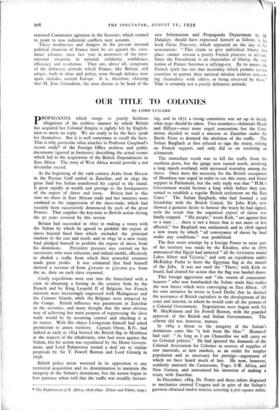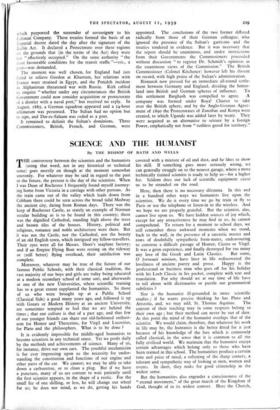OUR TITLE TO COLONIES
By LORD LU.GARD
pROPAGANDA which stoops to purely fictitious 1 allegations of the ruthless manner by which Britain has acquired her Colonial Empire is rightly felt by English- men to merit no reply. We are ready to let the facts speak for themselves. But it is well sometimes to recall the facts. That is why particular value attaches to Professor Coupland's recent study* of the Foreign Office archives and public documents (quoted in footnotes) describing the actual events which led to the acquisition of the British Dependencies in East Africa. The story of West Africa would provide a not dissimilar record.
At the beginning of the 19th century Arabs from Muscat in the Persian Gulf settled in Zanzibar, and in 1840 the great Said bin Sultan transferred his capital to the island. It grew rapidly in wealth and prestige as the headquarters of the export of slaves and ivory. Britain had at this time no share in East African trade and her interests were confined to the suppression of the slave-trade, which had recently been successively denounced by each of the great Powers. That supplies the key-note to British action during the 30 years covered by this review.
Britain had succeeded in 1822 in making a treaty with the Sultan by which he agreed to prohibit the export of slaves beyond fixed lines which excluded the principal markets to the east and south, and in 1845 in a new treaty Said pledged himself to prohibit the export of slaves from his dominions. Persistent pressure was exerted on his successors, who were reluctant, and indeed unable, effectively to abolish a traffic from which their powerful retainers made great profits. It was estimated that Said himself derived a revenue of from £1 0,000 to £20,000 p.a. from the 9s. duty on each slave exported.
Costly expeditions were sent into the hinterland with a view to obtaining a footing in the country both by the French and by King Leopold II of Belgium, but French interests were increasingly engrossed with Madagascar and the Comoro Islands, while the Belgians were attracted by the Congo. British influence was paramount in Zanzibar in the seventies, and many thought that the most obvious way of achieving her main purpose of suppressing the slave trade would be by assuming control and checking it at its source. With this object Livingstone himself had asked permission to annex territory. Captain Owen, R.N., had indeed as early as 1824 hoisted the British flag in Mombasa at the request of the inhabitants, who had risen against the Sultan, but his action was repudiated by the Home Govern- ment, and Lord Palmerston turned a deaf ear to similar proposals by Sir T. Fowell Buxton and Lord Glenelg in 1838.
British policy never wavered in its opposition to any territorial acquisition and its determination to maintain the integrity of the Sultan's dominions, but the nation began to lose patience when told that the traffic was steadily increas- * The Exploitation of E. Africa, 1856-1890. (Faber and Faber, 1939.) ing, and in 1871 a strong committee was set up io decide what steps should be taken. Two members—Admirals Heath and Hillyer—once more urged annexation, but the Com- mittee decided to send a mission to Zanzibar under Sir Bartle Frere to demand the abolition of the traffic. The Sultan Barghash at first refused to sign the treaty, relying on French support, and only did so on receiving an ultimatum.
The immediate result was to kill the traffic from the southern ports, but the gangs now turned north, involving a long march overland, with increased mortality among the slaves. Once more the necessity for the British occupation of Mombasa was urged in order to cut this route, and found support in Parliament, but the only reply was that " H.M.'s Government would hesitate a long while before they con- sented to establish a regular British settlement on the East Coast." The Sultan Barghash, who had formed a real friendship with the British Consul, Sir John Kirk, now showed a genuine desire to honour the treaty he had signed, with the result that the organised export of slaves was finally stopped. "His people," wrote Kirk, "are against him to a man . . . there is not a house that is not more or less affected," but Barghash was undaunted, and in 1876 signed a new treaty by which "all conveyance of slaves by land under any conditions" was prohibited.
The first overt attempt by a foreign Power to seize part of his territory was made by the Khedive, who in 1876 announced that Egypt had annexed "all the territories round Lakes Albert and Victoria," and sent an expedition under McKinlop Pasha to hoist the Egyptian flag at the mouth of the Juba. It was not until the 'Thetis,' with Kirk on board, had cleared for action that the flag was hauled down.
This foreign aggression and "the swarm of concession- hunters" who now bombarded the Sultan made him realise the new forces which were converging on East Africa. Of his own initiative he wrote to Lord Derby that he desired the assistance of British capitalists in the development of the coast and interior, to whom he would cede all the powers of a Colonial Government. Negotiations were begun with Sir W. MacKinnon and Sir Fowell Buxton, with the guarded approval of the British and Indian Governments. The scheme did not, however, mature.
In 1884 a threat to the integrity of the Sultan's dominions came like "a bolt from the blue." Bismarck had said: "As long as I am Chancellor we will carry on no Colonial policies." He had ignored the demands of the Colonial Association for Colonies as sources of supplies of raw materials, as new markets, as an outlet for surplus population and as necessary for prestige—arguments of which we have heard much of late. He now, however, suddenly annexed the Cameroons, Togo, S.W. Africa, and New Guinea, and announced his intention of making a treaty with Zanzibar.
In December, 1884, Dr. Peters and three others disguised as mechanics entered Usugara and in spite of the Sultan's garrison obtained twelve treaties covering 2,500 square miles, which purported the surrender of sovereignty to his Colonial Company. These treaties formed the basis of an Imperial decree dated the day after the signature of the Berlin Act. It declared a Protectorate over these regions on the grounds that (in the terms of the Act) they were not "effectively occupied." On the same authority "the most favourable conditions for the transit traffic "—viz., a port—was demanded.
The moment was well chosen, for England had just failed to relieve Gordon at Khartum, her relations with France were strained in Egypt, and the Penjdeh incident in Afghanistan threatened war with Russia. Kirk cabled to enquire "whether under any circumstances the British Government could now consider acquisition or protectorate of a district with a naval port," but received no reply. In August, 1885, a German squadron appeared and a 24-hour ultimatum was presented. The Sultan had no option but to sign, and Dar-es-Salaam was ceded as a port.
It remained to delimit the Sultan's dominions. Three Commissioners, British, French, and German, were appointed. The conclusions of the two. former differed radically from those of their German colleague, who ignored the presence of the Sultan's garrisons and the treaties tendered in evidence. But it was necessary that the report should be unanimous, and under instructions from their Governments the Commissioners proceeded without discussion "to register Dr. Schmidt's opinions as the unanimous views of the Commission." The British Commissioner (Colonel Kitchener) however left his dissent on record, with high praise of the Sultan's administration.
Bismarck now pressed for an immediate all-round settle- ment between Germany and England, dividing the hinter- land into British and German spheres of influence. To this settlement Barghash was compelled to agree. A company was formed under Royal_ Charter to take over the British sphere, and by the Anglo-German Agree- ment of 1890 the Protectorates of Zanzibar and Kenya were created, to which Uganda was added later by treaty. They were acquired as an alternative to seizure by a foreign Power, emphatically not from "ruthless greed for territory."









































 Previous page
Previous page